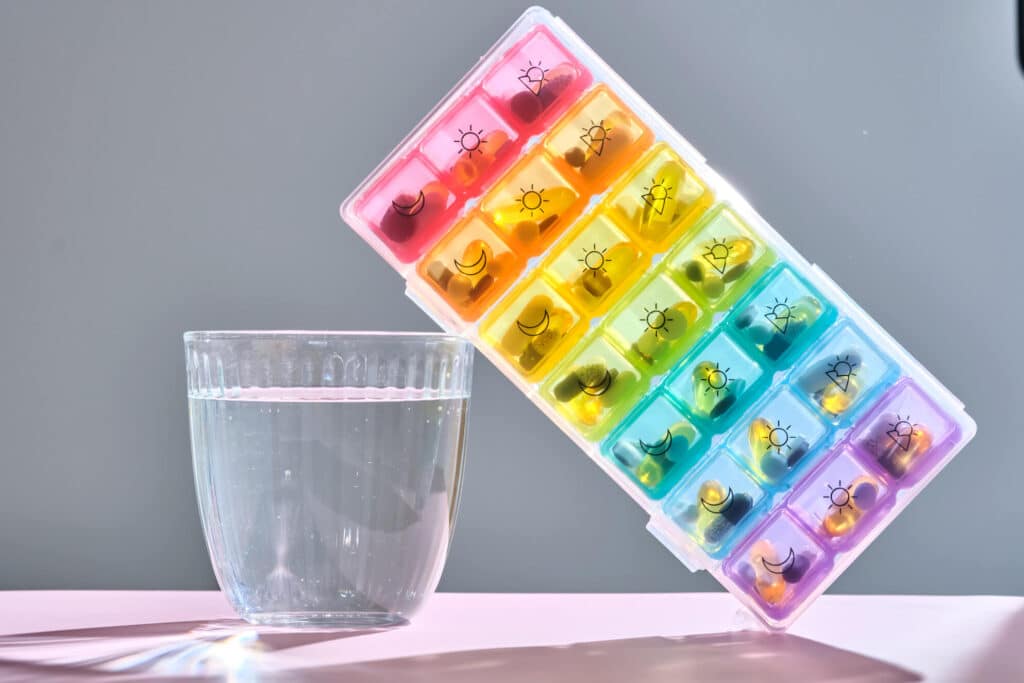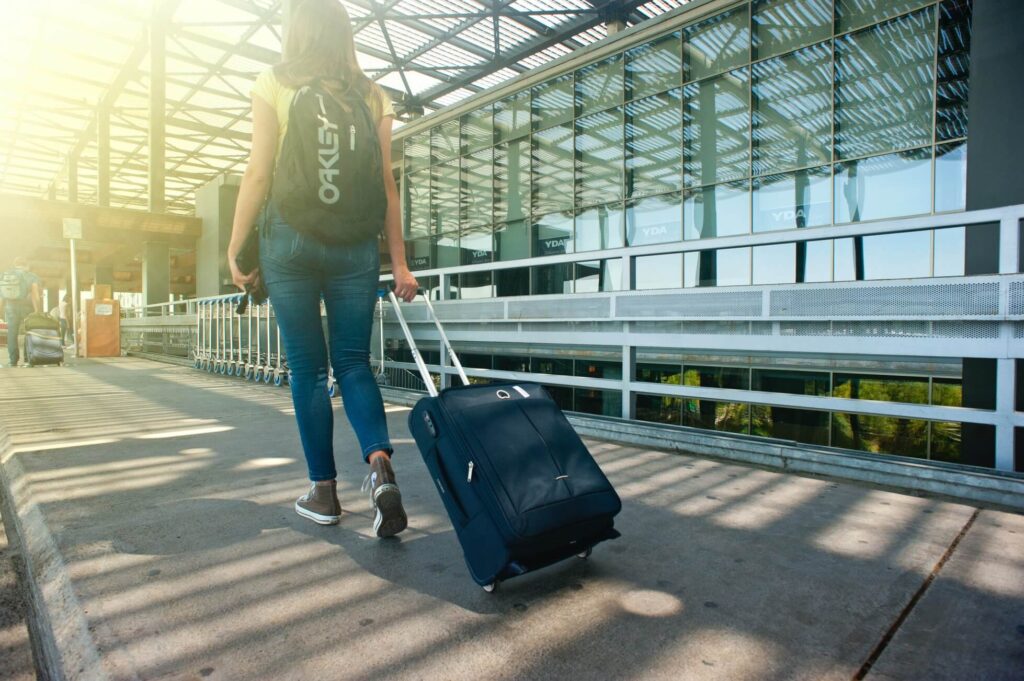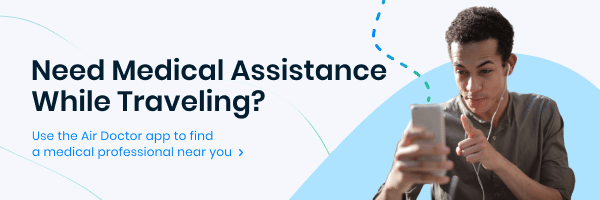Traveling with prescription drugs internationally requires some extra planning and consideration. So, whether you’re exploring a foreign country or going on a business trip, it’s essential to know how to travel with prescription medication to ensure a smooth journey and uninterrupted health management.
In this guide, we’ll cover everything you need to know about traveling with prescription medicine, from international regulations to obtaining prescriptions abroad and more.

Can you travel internationally with prescription drugs?
Can you travel with prescription medicine?
Yes, you can generally travel with prescription meds. However, it’s important to be aware of the specific regulations and restrictions of your destination country. Different countries have different rules about what medications are allowed, and what documentation you need to have with you.
For example, some countries require travelers to carry a doctor’s note, a translated prescription, or even a specific import permit for certain medications. It’s important to do your research and understand the specific rules of your destination country before traveling with prescription drugs internationally.
How to check local regulations for traveling with prescription medications?
Traveling with prescription medication can be a daunting task, especially if you’re not sure what the local regulations are in your destination country. To avoid any potential problems, it’s important to do your research and understand the specific rules of the country you’re visiting.
If you need information about traveling with prescription drugs internationally, here are a few tips on how to check local regulations for traveling with prescription drugs internationally:
- Contact the embassy or consulate of your destination country. This is the best way to get up-to-date information on the country’s medication importation policies. They will be able to tell you what medications are allowed, what documentation you need to have with you, and any other important information you need to know.
- Consult with a travel health specialist. A travel health specialist can help you understand the local regulations for your destination country and make sure you have everything you need to travel safely.
- Check the website of the Centers for Disease Control and Prevention (CDC). The CDC website has a wealth of information on traveling with prescription medications, including a list of countries with specific regulations.
- Do a Google search. A simple Google search can often turn up helpful information on the local regulations for traveling with prescription medications.
Once you’ve done your research, you’ll be well on your way to traveling with prescription medications safely and legally.

How to travel with prescription drugs internationally: flying with prescribed medication
Traveling with prescription drugs internationally can be a daunting task, but it doesn’t have to be. By following a few simple guidelines, you can ensure that you have everything you need during your journey and avoid any potential problems with the TSA.
Tips for flying with prescription medications:
- The best way to travel with prescription medication is to keep your medications in their original packaging, labeled with your name, prescription details, and dosage instructions.
- Pack your medications in your carry-on bag. This will help prevent loss or delays.
- Bring extra medications. Pack more than enough medication to cover your trip in case of unexpected delays or extensions.
- Store medications properly. Ensure medications are stored at the appropriate temperature, especially if some require refrigeration.
- Check the rules for liquids and gels, as some countries have restrictions on the amount of these items you can bring into the country.
- Contact the embassy or consulate of your destination country for up-to-date information on the country’s medication importation policies.
Familiarize yourself with TSA regulations for traveling with prescription medications:
When it comes to traveling with prescriptions TSA allows you to bring prescription medications in your carry-on bag or your checked luggage. However, there are some specific requirements that you must follow:
- Medications must be in their original containers, labeled with your name and prescription details.
- Liquid medications must be in containers that are 3.4 ounces or less and placed in a single, clear, quart-sized zip-top bag.
- If you have more than 3.4 ounces of a liquid medication, you can bring it with you if you have a doctor’s note or prescription.
- Controlled substances must be declared to the TSA at the security checkpoint.
Check out our comprehensive guide on Flying with Prescribed Drugs: How-to Pack, Tips & More! [Ultimate Travel Guide]. This guide covers essential tips on organizing your medications, packing them securely, and carrying the necessary documentation.
What should you do when you need to fill a prescription abroad?
When it comes to international travel with prescription meds, the thought of running out of medication while abroad can be stressful. If you find yourself in this situation, there are a few things you can do.
Can you fill prescriptions abroad?
In most cases, you can fill prescriptions abroad. However, there are some important factors to consider, like medication importation policies of your destination country and the availability of your medication in that country.
How to fill prescriptions abroad:
Here are some tips on how to fill prescriptions abroad:
- Do your research. Before you travel, it’s a good idea to do some research on the medication importation policies of your destination country. This will help you understand what medications are allowed and what documentation you need to have with you.
- Contact your doctor. If you’re not sure whether you can fill your prescription abroad, contact your doctor. They may be able to prescribe the medication you need or recommend a local healthcare provider who can help you.
- Bring a copy of your prescription. It’s always a good idea to bring a copy of your prescription with you when you travel. This will make it easier to fill your prescription if you need to.
- Be prepared to pay out of pocket. Even if your insurance company covers the cost of filling a prescription abroad, you may still have to pay a copayment or deductible. It’s important to be prepared to pay out of pocket for your medication if necessary.
Running out of medication while abroad can be stressful. Check out our guide on
Filling Prescriptions Abroad: When Travelling Internationally for step-by-step instructions on obtaining prescription medications in a foreign country.

How to get prescriptions abroad:
If you need a new prescription while traveling, it’s essential to know the options available to you. Here are some tips to help you prepare before your trip when traveling with prescriptions internationally, and even how you can get prescriptions when traveling.
The importance of being prepared:
Preparing before your trip, like arranging prescriptions for medications, is crucial because regulations vary from country to country. When it comes to traveling with prescription drugs internationally, you’ll want to make sure you have the required documentation and understand local laws. This guarantees a smooth journey and ensures you can maintain your medication management. If you don’t prepare you could face unexpected hurdles and potential health risks, so research and plan for a safe and enjoyable travel experience.
Taking prescription drugs abroad – preparing before your trip:
- Talk to your doctor. Before you travel, talk to your doctor about your medication needs. They can help you understand the medication importation policies of your destination country and recommend a course of action if you need to get a new prescription while you’re abroad.
- Get a copy of your prescription. Make sure you have a copy of your prescription with you when you travel. This will make it easier to fill your prescription if you need to.
- Research the medication importation policies of your destination country. Different countries have different rules about what medications are allowed and what documentation you need to have with you. Do some research before you go to make sure you know what to expect.
How to get prescriptions when traveling:
When it comes to international travel prescriptions, there are a few different ways to get prescriptions when you’re traveling abroad:
- Contact your doctor or a local healthcare provider. Your doctor or a local healthcare provider may be able to prescribe the medication you need.
- Visit a local pharmacy. Many pharmacies in foreign countries can fill prescriptions from doctors in other countries. However, it’s important to check with the pharmacy before you go to make sure they can fill your prescription.
- Use a travel health clinic or medical tourism company. Travel health clinics and medical tourism companies can help you get prescriptions while you’re abroad. They often have a network of doctors and pharmacies that they work with, so they can help you find the best option for your needs.
Head to our blog post: Prescriptions While Traveling: Your Guide to Getting Medication Abroad, for the ultimate guide on getting prescriptions while abroad. It explains various ways to obtain necessary prescriptions in different countries and more useful tips for international travel and prescription medication.

What to do if you lose your medication while abroad
- Take a deep breath and stay calm. It’s okay to be upset, but it’s important to stay calm so you can think clearly.
- Retrace your steps. Go back to the last place you remember having your medication and thoroughly search the area.
- If you’re traveling, report the loss to the local police. You can also ask them for a written report for documentation.
- Contact your doctor and pharmacy. Let them know that you’ve lost your medication and see if they can help you get a replacement.
- If it’s a critical medication, contact your doctor immediately. They can advise you on the next steps, which may include getting an emergency prescription or switching to a different medication.
- Consider using a pill organizer or keeping your medications in a secure location. This can help prevent future losses.
What to consider when traveling with prescription drugs
- Check the local regulations: Research the specific country’s laws and regulations regarding prescription medications to ensure compliance.
- Carry a doctor’s note: Obtain a letter from your healthcare provider stating your medical condition, prescribed drugs, and their purpose for customs clearance.
- Make sure you have sufficient supply: Carry an adequate amount of medication for the entire trip, including extra for unexpected delays.
- Don’t throw away original packaging: Keep medications in their original labeled containers to avoid confusion and prove legitimacy.
- Translation services if needed: If traveling to a country with a different language, have a translated copy of your prescription and medical documents.
- Always declare at customs: Disclose your prescription drugs to customs officials, if required, to prevent any issues at the border.
- Secure storage: Keep medications in a safe and cool place to maintain their efficacy throughout the journey.
Dealing with travelers’ diarrhea & getting prescription meds abroad
While traveling, a common health concern many people experience is travelers’ diarrhea. Changes in diet, water quality, and exposure to new bacteria can lead to this uncomfortable condition. Make sure you’re prepared and know what to do by reading our blog post on Traveler’s Diarrhea: Getting Prescribed Medicine Abroad.
Remember, seeking medical help can make a significant difference in quickly overcoming this temporary health issue and getting back to enjoying your travel adventures.
How Air Doctor can help you
Air Doctor is a valuable resource for travelers. The easy-to-use app instantly and seamlessly connects travelers to a global network of over 20,000 multi-lingual doctors and specialists so they can access trusted, quality medical care anywhere, anytime.
If you ever find yourself in need of medical assistance during your journey, you can use Air Doctor (with or without insurance) to find a doctor that meets your preferences (like language, gender, specialty, and more), and choose from clinic, at-home (hotel), and video consultations.
The Air Doctor solution accommodates multiple languages – with 24/7 multi-lingual support, doctors proficient in multiple languages, and an app which supports various major languages – in addition to video consultations in up to 21 languages.
Plus, we’re able to provide valid, local prescriptions through our cross-border telemedicine services.
The service makes it easier to manage any health-related concerns while traveling.
Download the app before your next trip.
Safe travels!













